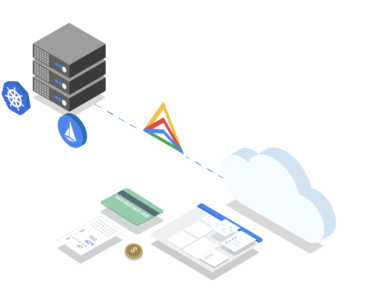Intel, Lenovo Partner with Google on Anthos Cloud

Source: Google Cloud
Google is filling out its roster of hardware partners for its new cloud services platform called Anthos as its pushes home-grown technologies like its Kubernetes cluster orchestrator across hybrid and cloud-native deployments.
Anthos, formerly Google’s cloud services platform, combines Kubernetes, the Istio service mesh and related open-source components into a framework aimed at achieving interoperability between the Google cloud and on-premise infrastructure.
Google (NASDAQ: GOOGL) added a pair of cloud partnerships to its Anthos ecosystem this week, announcing it will work with chip maker Intel (NASDAQ: INTC) and server vendor Lenovo (OTCMKTS: LNVGY) to leverage Kubernetes for “workload portability” across hybrid cloud deployments.
Collaboration with Intel will focus on developing a new Anthos reference design based on the chip maker’s second-generation Xeon Scalable processor. The partners said Tuesday (April 9) the framework also would be tuned to the Kubernetes software stack to smooth the transfer of application workloads between public and private clouds.
Seeking to expand the application container “build-once-and-run-anywhere” approach, Lenovo said it would partner with Google to deliver Kubernetes consistency across hybrid deployments.
Lenovo noted that industry surveys reveal growing enterprise demand for on-premises Kubernetes deployments. “Organizations want to avoid any heavy lifting involved in operating Kubernetes clusters, and are looking to get the same public cloud-like experience in their own datacenters,” the server vendor noted in a blog post.
To that end, Lenovo said it has validated Google Cloud’s Anthos on its software-defined ThinkAgile platform. The integration would allow users to manage Kubernetes clusters and enforce security and other policies consistently across hybrid cloud deployments.
Google noted in a separate blog post that the partners would validate designs for server appliances that “integrate compute, storage and networking technologies with Anthos.”
Meanwhile, Intel’s hybrid cloud collaboration with Google includes the Anthos reference design based on the latest version of the chip maker’s Xeon Scalable CPU as well as its Optane persistent memory.
“Datacenter environments today are complex, and hardware and software infrastructure is not ‘one size fits all’,” said Urs Hölzle, Google Cloud’s senior vice president of technical infrastructure. The Anthos partnership “ensures that our customers can run their applications in the way that best suits them,” Hölzle added.
The cloud collaboration is the latest move by Intel to push its “data-centric computing” strategy built around its latest generation CPU and its Optane DB persistent memory. “We’re delivering an Intel technology foundation for customers to take advantage of their data, and that requires delivery of architectures that can span across various operating environments,” added Navin Shenoy, executive vice president and general manager of Intel’s Data Center Group.
The partners said a new Anthos reference design would be delivered by mid-year, with implementation expected by the end of 2019.
The hybrid cloud initiative also expands on Google’s adoption of Intel’s Optane persistent memory technology for big data workloads such as in-memory database applications.
Industry reaction to Google's Anthos initiative was positive. “Everyone agrees, the industry is zeroed-in on Kubernetes as the de facto solution for containerization," said Brian Kelly, CEO of hybrid cloud management vendor CloudBolt. Anthos "could be the needed push for enterprises to re-architect their VMs into containers."
--Editor's note: This story has been updated.
Related
George Leopold has written about science and technology for more than 30 years, focusing on electronics and aerospace technology. He previously served as executive editor of Electronic Engineering Times. Leopold is the author of "Calculated Risk: The Supersonic Life and Times of Gus Grissom" (Purdue University Press, 2016).











